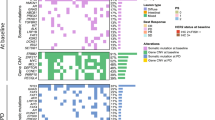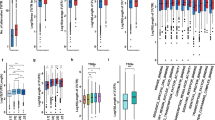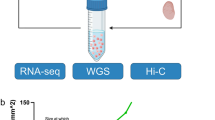Abstract
To investigate the relationship between polymorphism in the 3′-untranslated region (3′-UTR) of the thymidylate synthase (TS) gene and sensitivity of gastric cancer to 5-fluorouracil (5-FU)-based chemotherapy, 106 cases of advanced gastric cancer were analyzed. All patients were treated with 5-FU-based chemotherapy; DNA from peripheral blood leukocytes was obtained before therapy. TS 3′-UTR genotypes were detected by PCR-RFLP. Polymorphism in the TS 3′-UTR can be classified into three groups according to the presence or absence of a 6 bp nucleotide fragment: the −6/−6 bp, −6/+6 bp and +6/+6 bp groups. The response rate of the −6/−6 bp and −6/+6 bp groups was found to be significantly higher than the +6/+6 bp group. These results show that the presence of the TS 3′-UTR 6 bp nucleotide fragment can be correlated with the sensitivity of gastric cancer to 5-FU-based chemotherapy, and that the TS 3′-UTR polymorphism profile can be used to guide the choice of 5-FU-based chemotherapy in advanced gastric cancer.
Similar content being viewed by others
Log in or create a free account to read this content
Gain free access to this article, as well as selected content from this journal and more on nature.com
or
References
Ajani JA (2002) Docetaxel for gastric and esophageal carcinomas. Oncology 16:89–96
Berardi R, Scartozzi M, Romagnoli E, Antognoli S, Cascinu S (2004) Gastric cancer treatment: a systematic review. Oncol Rep 11:911–916
Calascibetta A, Cabibi D, Martorana A, Sanguedolce G, Rausa L, Feo S, Dardanoni G, Sanguedolce R (2004) Thymidylate synthase gene promoter polymorphisms are associated with TSmRNA expressions but not with microsatellite instability in colorectal cancer. Anticancer Res 24:3875–3880
Coombes RC, Chilvers CE, Amadori D, Medi F, Fountzilas G, Rauschecker H, Vassilopoulos P, Ferreira EP, Vannozzi G, Bliss JM et al (1994) Randomised trial of epirubicin versus fluorouracil in advanced gastric cancer. An International Collaborative Cancer Group (ICCG) study. Ann Oncol 5:33–36
Findlay M, Cunningham D (1993) Chemotherapy of carcinoma of the stomach. Cancer Treat Rev 19:29–44
Gao CM, Takezaki T, Wu JZ, Liu YT, Ding JH, Li SP, Su P, Hu X, Kai HT, Li ZY, Matsuo K, Hamajima N, Sugimura H, Tajima K (2004) Polymorphisms in thymidylate synthase and methylenetetrahydrofolate reductase genes and the susceptibility to esophageal and stomach cancer with smoking. Asian Pac J Cancer Prev 5:133–138
Horie N, Aiba H, Oguro K, Hojo H, Takeishi K (1995) Functional analysis and DNA polymorphism of the tandemly repeated sequences in the 5′-terminal regulatory region of the human gene for thymidylate synthase. Cell Struct Funct 20:191–197
Kim NK, Park YS, Heo DS, Suh C, Kim SY, Park KC, Kang YK, Shin DB, Kim HT, Kim HJ, et al (1993) A phase III randomized study of 5-fluorouracil and cisplatin versus 5-fluorouracil, doxorubicin, and mitomycin C versus 5-fluorouracil alone in the treatment of advanced gastric cancer. Cancer 71:3813–3818
Kohne CH, Wils JA, Wilke HJ (2000) Developments in the treatment of gastric cancer in Europe. Oncology 14:22–25
Kollmannsberger C, Quietzsch D, Haag C, Lingenfelser T, Schroeder M, Hartmann JT, Baronius W, Hempel V, Clemens M, Kanz L, Bokemeyer C (2000) A phase II study of paclitaxel, weekly, 24-hour continuous infusion 5-fluorouracil, folinic acid and cisplatin in patients with advanced gastric cancer. Br J Cancer 83:458–462
Lecomte T, Ferraz JM, Zinzindohoue F, Loriot MA, Tregouet DA, Landi B, Berger A, Cugnenc PH, Jian R, Beaune P, Laurent-Puig P (2004) Thymidylate synthase gene polymorphism predicts toxicity in colorectal cancer patients receiving 5-fluorouracil-based chemotherapy. Clin Cancer Res 10:5880–5888
Louvet C, Andre T, Tigaud JM, Gamelin E, Douillard JY, Brunet R, Francois E, Jacob JH, Levoir D, Taamma A, Rougier P, Cvitkovic E, de Gramont A (2002) Phase II study of oxaliplatin, fluorouracil, and folinic acid in locally advanced or metastatic gastric cancer patients. J Clin Oncol 20:4543–4548
Mandola MV, Stoehlmacher J, Zhang W, Groshen S, Yu MC, Iqbal S, Lenz HJ, Ladner RD (2004) A 6 bp polymorphism in the thymidylate synthase gene causes message instability and is associated with decreased intratumoral TS mRNA levels. Pharmacogenetics 14:319–327
Marsh S, Collie-Duguid ES, Li T, Liu X, McLeod HL (1999) Ethnic variation in the thymidylate synthase enhancer region polymorphism among Caucasian and Asian populations. Genomics 58:310–312
Merkelbach-Bruse S, Hans V, Mathiak M, Sanguedolce R, Alessandro R, Ruschoff J, Buttner R, Houshdaran F, Gullotti L (2004) Associations between polymorphisms in the thymidylate synthase gene, the expression of thymidylate synthase mRNA and the microsatellite instability phenotype of colorectal cancer. Oncol Rep 11:839–843
Miller AB, Hoogstraten B, Staquet M, Winkler A (1981) Reporting results of cancer treatment. Cancer 47:207–214
Parkin DM, Pisani P, Ferlay J (1999) Estimates of the worldwide incidence of 25 major cancers in 1990. Int J Cancer 80:827–841
Tsai JY, Safran H (2003) Status of treatment for advanced gastric carcinoma. Curr Oncol Rep 5:210–218
Ulrich CM, Bigler J, Velicer CM, Greene EA, Farin FM, Potter JD (2000) Searching expressed sequence tag databases: discovery and confirmation of a common polymorphism in the thymidylate synthase gene. Cancer Epidemiol Biomarkers Prev 9:1381–1385
Zhang Z, Xu Y, Zhou J, Wang X, Wang L, Hu X, Guo J, Wei Q, Shen H (2005) Polymorphisms of thymidylate synthase in the 5′- and 3′-untranslated regions associated with risk of gastric cancer in South China: a case–control analysis. Carcinogenesis 26:1764–1769
Acknowledgments
This work was supported by the Social Development Scientific Foundation of Jiangsu Science and Technology Department (BS2003048) and supported by the Special Foundation on International Academic Cancer Study of the Japanese Ministry of Education (08042015).
Author information
Authors and Affiliations
Corresponding author
Rights and permissions
About this article
Cite this article
Lu, JW., Gao, CM., Wu, JZ. et al. Polymorphism in the 3′-untranslated region of the thymidylate synthase gene and sensitivity of stomach cancer to fluoropyrimidine-based chemotherapy. J Hum Genet 51, 155–160 (2006). https://doi.org/10.1007/s10038-005-0339-4
Received:
Accepted:
Published:
Issue date:
DOI: https://doi.org/10.1007/s10038-005-0339-4
Keywords
This article is cited by
-
Pharmacogenetic variants associated with outcome in patients with advanced gastric cancer treated with fluoropyrimidine and platinum-based triplet combinations: a pooled analysis of three prospective studies
The Pharmacogenomics Journal (2017)
-
The effects of genomic polymorphisms in one-carbon metabolism pathways on survival of gastric cancer patients received fluorouracil-based adjuvant therapy
Scientific Reports (2016)
-
Germline oncopharmacogenetics, a promising field in cancer therapy
Cellular Oncology (2015)
-
Relationship Between the DPD and TS mRNA Expression and the Response to S-1-Based Chemotherapy and Prognosis in Patients with Advanced Gastric Cancer
Cell Biochemistry and Biophysics (2015)
-
Association of thymidylate synthase gene 3'-untranslated region polymorphism with sensitivity of non-small cell lung cancer to pemetrexed treatment: TS gene polymorphism and pemetrexed sensitivity in NSCLC
Journal of Biomedical Science (2013)



